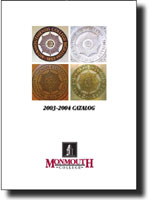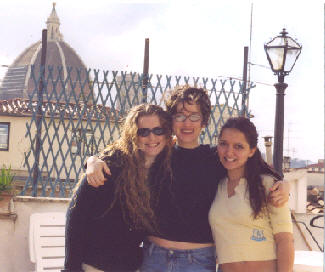|
English Courses Offered for the
Fall 2004 Semester

English 210: Beginning Creative Writing
This class is for
novice writers who write and have their material work-shopped by the
class. They are required to write either seven poems or forty pages
of prose. They also write a research paper on a contemporary author.
Grading is on effort and improvement. There are stories to read by
famous writers which illustrate certain artistic points.
This course
is being taught by Mary Bruce.
English 220: British
Survey I
This course is a historical
survey emphasizing literary and cultural developments in English
literature from the Old English period through the English
Renaissance. This course is being taught by Marlo Belschner.
English 224: American Survey I
This course is one of two
introductory surveys in American literature emphasizing literary
movements and cultural and historical developments in the literature
of the United States. Readings will include: Native American
creation myths, explorer narratives, poetry, fiction, and
non-fiction from such writers as Bradstreet, Cotton Mather, Edwards,
Franklin, Cooper, Emerson, Thoreau, Hawthorne, Poe, Melville,
Whitman, and Dickinson.
This course is
being taught by Craig Watson.
English 347: Contemporary American Novel
This course will cover works
written after 1945 by some of the following writers: Nathaniel West,
Ralph Ellison, Saul Bellow, Walker Percy, Ishmael Reed, Ann Beattie,
Leslie Marmon Silko, Don DeLillo, John Updike, Norman Mailer, Tony
Hillerman, Louise Erdrich, John Barth, Thomas Pynchon, Kurt
Vonnegut, Alice Walker, Philip Roth, J.D. Salinger, William Kennedy,
Bobbie Ann Mason, Richard Ford, Joseph Heller, Toni Morrison, etc.,
etc.—too much good work and too little time! We study literature
with reference to movements and events in turbulent years of
American cultural history. We also “play” with literary critical
approaches that “grew up” in the same precincts.
This course is being taught by Craig
Watson.
English 350
Section 1: Chaucer
This course is being taught by
Mark Willhardt.
Section 2: Victorian Culture
The course will explore a variety
of issues relevant to the early and Middle Victorian period
including industrialization, science, religion, "the woman
question," sexuality, medievalism, politics, and empire by examining
a number of literary and cultural "texts" including fiction, poetry,
paintings, music, theatre, and magazines. Authors/artists may
include Tennyson, Browning, Eliot, Doyle, Hunt, Kipling, Bronte,
Dickens, Rossetti, and Meredith (among others).
This course is
being taught by Rob Hale.
English
362: Shakespeare II
Studies in the tragedies and romances.
This course is being taught by Marlo Belschner.
English
430: Methods of Teaching
English
This course focuses on preparing
English/Education majors to teach high school English. We discuss
various methods for successful teaching and we design a couple of
practical literature units for the classroom.
This course is being taught by Kevin
Roberts.
English Courses
Offered for the Spring 2005 Semester

English 200: Introduction to English Studies
This course is a gateway to the English major. It is designed to
introduce majors and minors to the broad range of scholarship and
practice within the discipline of English. Included will be emphasis
upon close reading and research skills, as well as overviews of the
history of the discipline, creative writing, literary criticism and
theory, and vocational paths. This course is being taught by
Rob Hale.
English 201: Grammar
This course deals with basic
concepts in grammar (parts of speech, etc.), then moves into more
advanced details of diagramming sentences and looking at the origin
of grammar study. We will also try to work in some methods for
teaching grammar. This course is being
taught by Kevin Roberts.
English 210: Creative Writing
See Fall 2004
listing.
English 221: British Survey II
This course will emphasize major
literary movements and historical developments in English literature
from the Romantic period through the Modern period.
This course is
being taught by Rob Hale.
English
225: American Survey II
This course is an introductory
survey focusing on poetry and fiction written after the Civil War
and before American involvement in the Second World War. Included
are works from such writers as Jewett, Wharton, Twain, James, Kate
Chopin, Crane, Pound, Robinson, Frost, Anderson, Stevens, Eliot,
Fitzgerald, Hemingway, and Faulkner. There will be an emphasis on
literary, cultural, and historical movements. The course is a
continuation of English 224, but may be taken alone and without
regard to sequence. Course instructor TBA.
English
301: Advanced Composition
This course is a study of
rhetorical strategies and their application to assignments in
journalism, scientific writing, and essay writing. It will be open
to juniors and seniors or by consent of the instructor. This
course is being taught by Mark Willhardt.
English 310: Advanced Creative Writing
This course
parallels the creative writing course (English 210) however, the
standard is higher. Students are to produce publishable work and
submit it. Also the writing demands are greater. Students must write
fourteen poems or eighty pages of prose and submit weekly market
reports. This course is being taught by Mary Bruce.
English 350
Section 1:
Literary Representations of Hell
“The mind is its own place, and
in itself/ Can make a heaven of hell, a hell of heaven” (Milton
Paradise Lost I.253). Ah, the intellectual pleasures of hell!
Come make “a heaven of hell.” Dante’s The Inferno and
Milton’s Paradise Lost will be the cornerstones of this
course with other possible works including classical and religious
(western and non-western) texts with images of hell (think Orpheus),
Marlowe’s Dr. Faustus, Faust, Blake’s Marriage of
Heaven and Hell, and Sartre’s No Exit. Emphasis will be
on the cultural and political echoes in these works as well as the
literary and religious.
This course is
being taught by Marlo Belschner.
Section 2: Transatlantic Lit of
the 1890’s
This course will
examine and compare literature of England and America written during
the last decade of the nineteenth century. Authors may include
Wilde, Doyle, Hardy, Norris, Jewett, Kipling, Bierce, Field, Symons,
Johnson, Stoker (among others). We will explore the literature in
terms of several artistic movements including aestheticism,
decadence, naturalism, and regionalism.
This course is
being taught by Rob Hale.
Section 3: Modernist Poetry
This course is being taught by
Mark Willhardt.
English 400: Senior Seminar
An intensive study of key
literary periods and subjects. Recent seminars have focused upon:
“Literature of the American South,” “New England Women Writers of
the Late 19th Century,” “The Gothic Tradition,” “The American
Expatriate Experience in Literature” and “Arthurian Literature.”
Required of all senior English majors.
This course is
being taught by Craig Watson. |


